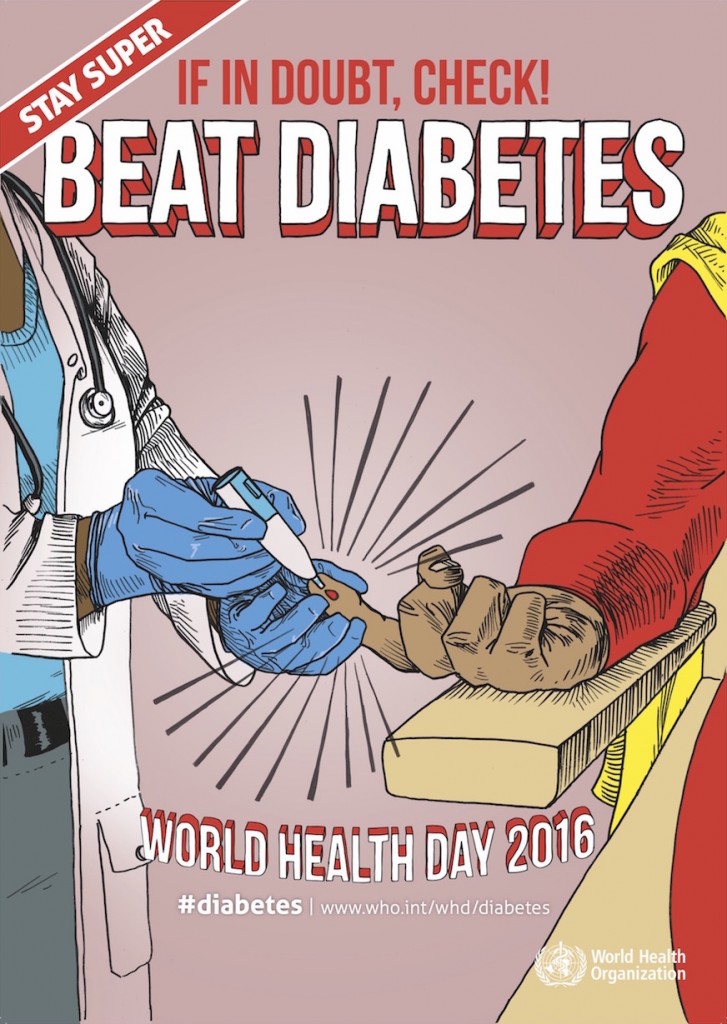Beat Diabetes -World Health Day
Thursday 7 April is World Health Day, and this year the campaign is focused on halting the rise of diabetes around the globe.
The World Health Organisation estimates that about 350 million people worldwide have diabetes; of those cases, around 90% are type 2.
While the genetic cause and a permanent cure for type 1 diabetes is currently unknown, type 2 diabetes is largely preventable and can be managed in part through sensible lifestyle choices like diet and exercise.
This year, take the time to learn the symptoms of diabetes and educate yourself about how to minimise the risks – it could save your life.
The symptoms

The symptoms for type 1 and type 2 diabetes are much the same, but when and how we experience the symptoms are slightly different.
Type 1 diabetes often develops quickly within weeks or even days – it can develop at any age, but typically appears before the age of 40 and especially in childhood.
Type 2 diabetes on the other hand is most common in adults over the age of 40 and the symptoms can develop slowly over a period of weeks, months or years, and may not be immediately apparent. For many people, diabetes is diagnosed through a routine check-up with their doctor.
Some of the most common symptoms include:
- Feeling very thirsty
- Needing a wee more frequently than usual, in particular at night
- Feeling very tired or exhausted
- Unexplained weight loss or loss of muscle bulk
- Blurred vision and headaches
Since the symptoms tend to be general, people can sometimes live with diabetes for years without realising.
If you do have symptoms however, speak to your GP – the sooner you can manage your diabetes, the lower the risk of developing complications from it.
Lowering risk
Unlike type 1 diabetes where the cause is completely out of our control, with type 2 diabetes there are things you can do to help reduce the risk of it developing. Risk factors include genetics and ethnicity, which can’t be changed, but also include weight, lifestyle and diet.
People with a BMI of over 25 are at higher risk than those in the healthy range. Similarly, those with a high waist measurement (31.5 inches for women, 37 inches for white and black men, 35 inches for Asian men) are also at greater risk.
You can minimise your risk by taking a sensible approach to diet and exercise; as little as 30 minutes of moderate-intensity exercise several times a week and a balanced diet that avoids food and drink high in fat and sugar will greatly reduce the chance of developing diabetes as you age.
Likewise, if you’re overweight, losing weight safely to come within the healthy range can also lower your risk. Like many other diseases, drinking alcohol only in moderation and quitting smoking will also lower risk.
Complications from diabetes
There’s no cure for diabetes, but for many, type 2 diabetes can be managed through healthy diet and regular exercise, and by closely monitoring your health. If your diabetes progresses, you may eventually need medication to help keep your blood glucose at a normal level.
Simple changes can be enough to improve your health and condition; increasing the amount of fibre in your diet, avoiding saturated fat and high-fat foods, and eating plenty of fruit, unsalted nuts, vegetables and fish and lean meats can go a long way to helping keep your blood sugar levels stable.
Ignoring diabetes is never the answer – if you have been diagnosed or suspect you could be at risk of diabetes, speak to your GP. Complications from diabetes can lead to serious long-term health problems that can impact your quality of life. It’s the most common cause of vision loss and blindness and puts you up to five times more likely to develop heart disease of have a stroke. Kidney disease, sexual dysfunction and foot problems are all complications that can also arise.
Has World Health Day inspired you to think about diabetes differently? Were you aware of the risks? Let us know your experiences with diabetes in the comments below.
Disclaimer
All content on Silversurfers.com is provided for general information only, and should not be treated at all as a substitute for the medical advice of your own doctor or any other health care professional. Silversurfers will not be responsible or liable for any diagnosis made by a user based on the content on www.silversurfers.com and we are also not liable for the content of any external websites or links from or to Silversurfers to any other websites. Please always consult your own doctor if you’re in any way concerned about any aspect of your health.
Rachel - Silversurfers Assistant Editor
Latest posts by Rachel - Silversurfers Assistant Editor (see all)
- Chocolate dipped strawberries for Easter - April 13, 2025
- Easter activities for grandchildren - March 31, 2025
- Songs about Mum for Mothering Sunday - March 26, 2025
- The best of Diana Ross - March 25, 2025
- Elton John’s Greatest Hits Playlist - March 24, 2025




















